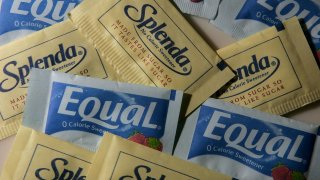
Let's keep this short and sweet: do not use sugar substitutes while trying to lose weight.
The World Health Organization released a new guideline warning against the use of artificial sweeteners to control body weight or reduce the risk of noncommunicable diseases.
A systematic review suggests that use of non-sugar sweeteners does not show any long-term benefit in reducing body fat in adults or children. Long-term use of sugar substitutes, the review shows, could cause "undesirable effects" such as an increase the risk of type 2 diabetes, cardiovascular diseases, and mortality in adults.
"Replacing free sugars with NSS does not help with weight control in the long term. People need to consider other ways to reduce free sugars intake, such as consuming food with naturally occurring sugars, like fruit, or unsweetened food and beverages,” says Francesco Branca, WHO Director for Nutrition and Food Safety. "NSS are not essential dietary factors and have no nutritional value. People should reduce the sweetness of the diet altogether, starting early in life, to improve their health."
Get Boston local news, weather forecasts, lifestyle and entertainment stories to your inbox. Sign up for NBC Boston’s newsletters.
Non-sugar sweeteners are widely used as an alternative to sugar in pre-packaged foods and beverages and added to food and beverages directly by the consumer. Common non-sugar sweeteners include acesulfame K, aspartame, advantame, cyclamates, neotame, saccharin, sucralose, stevia and stevia derivatives.
"The recommendation applies to all people except individuals with pre-existing diabetes and includes all synthetic and naturally occurring or modified nonnutritive sweeteners that are not classified as sugars found in manufactured foods and beverages, or sold on their own to be added to foods and beverages by consumers,” the World Health Organization said.
The International Sweeteners Association responded by calling the guideline a "disservice to public health", saying low/no calorie sweeteners have been extensively researched and approved by safety bodies around the world.
U.S. & World
Low/no calorie sweeteners, the association said, play a role in the fight against obesity, offer a sugar substitute for those with diabetes, do not contribute to tooth decay and help food and beverage companies reduce the amount of sugar used in products.
"Food and beverage companies have reformulated products as part of a comprehensive, global effort to meet public health recommendations (including from the WHO) for sugar reduction” ISA chairman Bob Peterson said in a statement. “Low/no calorie sweeteners have enabled this innovation and ultimately contribute to the creation of healthier food environments by allowing people to enjoy food and drinks with less sugar and fewer calories, while still meeting their taste preferences.”



